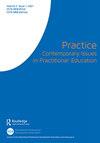Becoming a technology-capable language teacher: a new materialist perspective
Q2 Social Sciences
引用次数: 0
Abstract
ABSTRACT Research shows that in-service teachers often struggle to incorporate learned knowledge from their teacher education programs into the irregularities and complexities of their classrooms in part because of neoliberal values and practices that promote regularity and quantifiable outcomes. This is one of the reasons why, in recent years, a number of scholars have called for an ontological turn in teacher education that takes into consideration the intricacies and non-linearity of becoming a teacher. In the same spirit, this article draws on new materialist scholarship and the associated Deleuzo-Guattarian concepts of becoming, assemblage, affect, and learning (Deleuze & Guattari, 1987, 1994) to detail how two teacher trainees’ professional knowledge and selves were constantly re-shaped within tangles of relations between human, material, and expressive elements associated with an online teacher education course in technology-enhanced language education with an optional community service learning component. Data consisted of the course assignments, student interviews, and online blogs. Through traditional analytical methods such as coding as well as relational practices such as rhizoanalysis, new knowledge and understandings were produced regarding the role played by matter in the relational production of teacher education. As such, this article shows how re-theorizing the function, and impact of human, expressive, and material elements in teacher education can open new avenues of potential transformation for teacher trainees away from neoliberal thinking and practices.成为一名技术型语文教师:一个新的唯物主义视角
本文章由计算机程序翻译,如有差异,请以英文原文为准。
求助全文
约1分钟内获得全文
求助全文

 求助内容:
求助内容: 应助结果提醒方式:
应助结果提醒方式:


